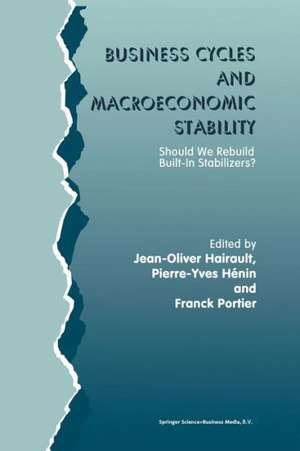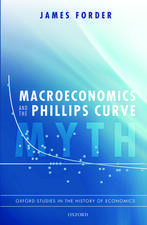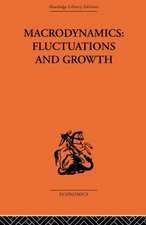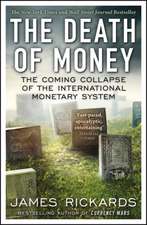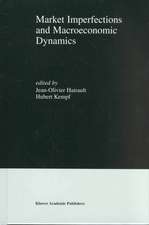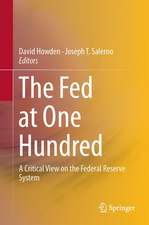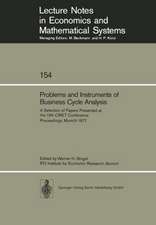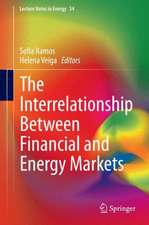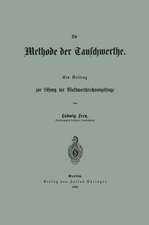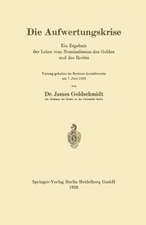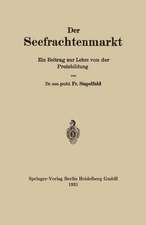Business Cycles and Macroeconomic Stability: Should We Rebuild Built-in Stabilizers?
Editat de Jean-Olivier Hairault, Pierre-Yves Hénin, Franck Portieren Limba Engleză Paperback – 3 oct 2012
| Toate formatele și edițiile | Preț | Express |
|---|---|---|
| Paperback (1) | 1220.45 lei 6-8 săpt. | |
| Springer Us – 3 oct 2012 | 1220.45 lei 6-8 săpt. | |
| Hardback (1) | 1226.42 lei 6-8 săpt. | |
| Springer Us – 29 apr 1997 | 1226.42 lei 6-8 săpt. |
Preț: 1220.45 lei
Preț vechi: 1488.34 lei
-18% Nou
Puncte Express: 1831
Preț estimativ în valută:
233.56€ • 242.94$ • 192.82£
233.56€ • 242.94$ • 192.82£
Carte tipărită la comandă
Livrare economică 15-29 aprilie
Preluare comenzi: 021 569.72.76
Specificații
ISBN-13: 9781461378303
ISBN-10: 1461378303
Pagini: 372
Ilustrații: XXV, 341 p.
Dimensiuni: 155 x 235 x 20 mm
Greutate: 0.52 kg
Ediția:1997
Editura: Springer Us
Colecția Springer
Locul publicării:New York, NY, United States
ISBN-10: 1461378303
Pagini: 372
Ilustrații: XXV, 341 p.
Dimensiuni: 155 x 235 x 20 mm
Greutate: 0.52 kg
Ediția:1997
Editura: Springer Us
Colecția Springer
Locul publicării:New York, NY, United States
Public țintă
ResearchDescriere
Setting the issue "Most economists consider the marked increase in automatic stabilizers a highly favorable development with respect to maintenance of economic stability". Besides the rare privilege of having being signed by both Milton Friedman and Paul Samuelson (Depres,Friedman, Hart, Samuelson, and Wallace [1950]), among others, this sentence expressed as soon as 1950 the consensus view on the stabilizing effect of fiscal rules governing tax revenue and public expendi tures and transfers. This positive ex ante assessment will have been confirmed ex post as part of the explanation for post war stabilization (Burns [1960], de Long and Summers [1986], Moore and Zarnovitz [1986]). However, it becomes disputed in both its positive and normative aspects. Many institutional changes since the eighties point at curbing back the transfer mechanisms underlying automatic stabilizers, and legal restraints on deficits such as the US balanced budget amendment or the European Maastricht criteria would involve serious risks for the future of stabilizers. Under such rules "the government would become, almost inevitally, a destabilizer rather than a stabilizer" said Joseph Stiglitz, quoted by the New York Times (April 1995)). "Built-in stabilizers are automatic fiscal adjustments that reduce the national income multiplier and thus cushion the effects of changes in autonomous spend ing on the level of income" (Pechman [1987]). Early analyses of the automatic fiscal stabilizers include the contributions of A. G. Hart [1945], R. Musgrave and M. Miller (1948) and E. C. Brown (1955).
Cuprins
Introduction; J.-O. Hairault, et al. Part I: Fiscal Policies, Business Cycle and Growth. 1. An Exploration Into the Effects of Dynamic Economic Stabilization; J. Dolmas, G.W. Huffman. 2. Optimal Public Spending in a Business Cycle Model; S. Ambler, E. Cardia. 3. Welfare, Stabilization or Growth: A Comparison of Different Fiscal Objectives; S.P. Cassou, K.J. Lansing. 4. Public Investment, Stabilization and Growth; F. Collard. Part II: Automatic Stabilizers in an Economic Union. 5. Monetary Union and the Role of Automatic Stabilizers; K.M. Kletzer, W.H. Buiter. 6. The Efficiency of National and Regional Stabilization Policies; T. Bayoumi, P.R. Masson. 7. Insurance Against Asymmetric Shocks in a European Monetary Union; J. von Hagen, G.W. Hammond. 8. Automatic Stabilizers in a European Perspective; F. Bec, J.-O. Hairault. Part III: Stabilization and Labour Market Policies. 9. The Cyclical Effects of Labour Market Policy; S.P. Millard. 10. Financing Unemployment Benefits in the Business Cycle: Stabilization, Welfare and Equity Issues; J.-O. Hairault, et al. Part IV: Empirical Evidence, Recent Trends and Problems on Stabilization. 11. Are Automatic Stabilizers Still Effective? The French Case in the Nineties; J.-P. Cotis, et al. 12. Output Stabilization Versus Deficit Sustainability: Is It a Trade- Off? B. Candelon, P.-Y. Hénin. 13. The Effects of Fiscal Policy and The Maastricht Solvency Criteria on European Employment; R. Barrell, et al. 14.Macroeconomic Effects of Fiscal Restructuring in Europe; A.H. Bayer, et al. Index.
